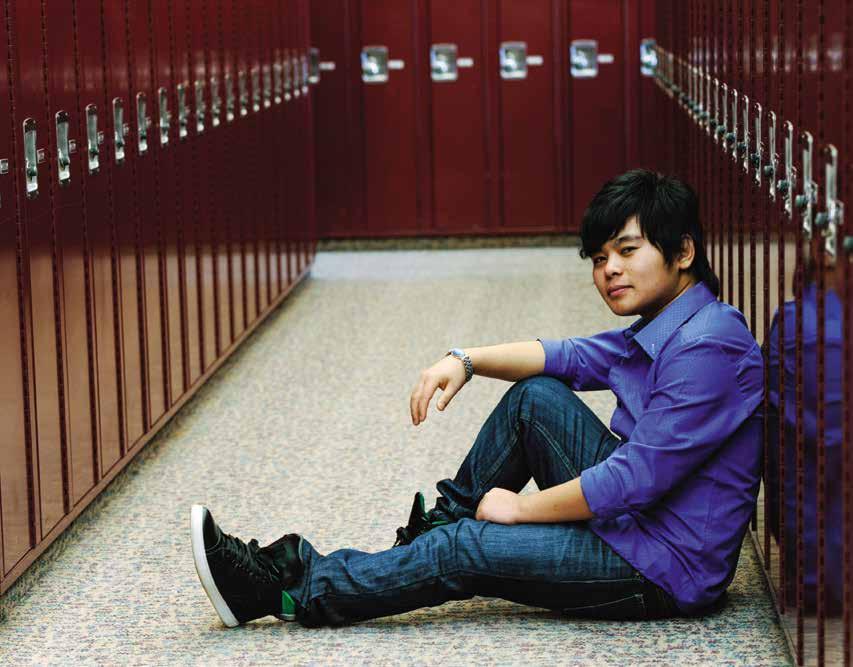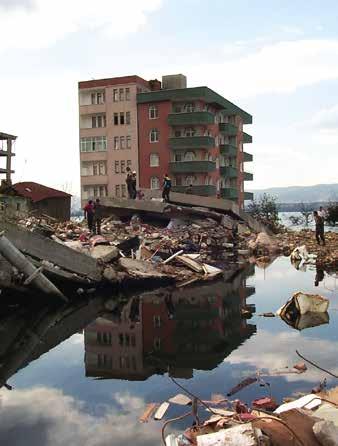
12 minute read
Neighbors
by Alicia Underlee Nelson
The ends of their scarves danced in the wind. Their brightly colored tunics billowed behind them, a softly rippling swoosh of vivid violet, luscious saffron, and prairie sky blue, giving them the look of a flock of exotic birds about to take flight.
Advertisement
I must have driven by this little procession daily. We were neighbors, after all. Yet I didn’t give them a thought until my first week back at work after a particularly great vacation. International travel wakes me up, makes me a little more engaged, a little more curious about the world around me. And this time, the effect clung to me long after my flight landed.

Abbas Jasam, Salima Rashieed and family visit Nolan and Doris Underlee and Wayne and Christy Underlee on the family farm.
I was back home, back to the grind and already frustrated. The world had opened up for me, but now I was right back where I started, smack dab in the middle of a calendar full of appointments, a twelve-hour work day with five minutes to inhale my lunch at my desk, and the constant ping of emails until well after midnight. This is what I was thinking about when I saw—really saw—the women on the sidewalk for the first time. They looked present, engaged, as if they were really seeing the sky and their friends and the kids at the bus stop and not rushing off to the next thing. This is a state of being I could only cultivate on vacation. I was jealous.
I wondered who they were and where they’d come from. I assumed they were immigrants because of their decidedly non-western clothing, and the fact that they seemed to be walking not for exercise but just for the pleasure of it. I wondered what they thought of my city and what place it held in their world.
So later that day I called Lutheran Social Services (LSS)—the only organization I could think of that might have answers. Then I asked the question that made all the difference: I asked how I could help.
A week later, I stood outside an apartment complex on the very same street with an LSS caseworker. She waved at current and former clients. I was correct in assuming the women out front were recent immigrants. What I hadn’t realized was that the majority of them were also refugees, individuals forced to flee their homes due to violence or persecution.
They were Bhutanese, Somali, Nepali, Iraqi. The caseworker was there to introduce me to one of them. She was not one of the women in colorful clothes, but a dark-eyed Iraqi with a shy smile. She cared for her two small children while her husband was at work, and she couldn’t get out to English classes with such little ones in tow. My assignment as a new volunteer was to chat with her and help her learn a little English before she started formal classes. I’ve been known to strike up conversations with strangers, so this seemed easy enough in theory. The reality was much more amusing.
I showed up a few days later at the appointed time, with my wedding album in hand. Her English was basic and my Arabic was nonexistent, so I figured showing her my family would be a whole lot easier than trying to explain them with hand gestures.
She opened the door, and it was immediately clear she hadn’t understood what the heck the case manager was talking about when she made this appointment the week before. She glanced from me, into the apartment, and back again, with politely and expertly masked panic. Now that I work from home with a toddler, I realize that she was having one of those days—the kind where you don’t want anyone to see you or your nightmare of a house, especially not some stupidly smiling stranger with a stack of books in a language you don’t understand. If I’d known then what I know now, I would have left so the poor woman could have gotten some sleep during what was surely the only moment she had to herself all day.

Ayat Hussein and the author.
But she was—and is—the consummate hostess, so she recovered quickly and invited me in. She spent the next ten minutes conjuring up an impressive spread of juices, fruit, cookies, and cake so extensive I didn’t need to eat dinner that night.
I ate quietly, and wondered what on earth we were supposed to do now. She sipped juice and fed the baby, who had just woken up and stared at me with enormous, knowing eyes. I had—I cannot stress this point enough—no earthly clue what I was doing. I didn’t know a single word of Arabic. How do you talk to someone without words? I assumed I’d just figure it out, but instead we both sat politely on the sofa and stared at each other.
She found the solution in the end. This was just the first of many, many times when she would quietly lead the lesson. She would pick up my glass and give me a prompting look. “Milk,” I’d say. She would nod and repeat the word in English. Then she would point to the glass again and say “halib,” and I would obediently say the word in Arabic. We’d worked our way through the oranges, grapes, and desserts on the table in front of me by the time her daughter woke up, and I remembered my photo album.
Her face lit up. “Ah, married!” she said, pointed at me.
“Yes,” I nodded. “Married.”
We had that in common, at least. She ran to get her wedding album and we sat with the black bound books open on our laps, side by side on the sofa.
She was a lovely bride, so young and pretty in a spectacular ball gown, dark curls cascading down her back.
“You look beautiful,” I said. Her cheeks went pink, but she smiled as she ducked her head.
She touched a photo in my book. “Beautiful.”
“Thank you,” I replied.
We smiled, and they were real smiles this time. We’d had a conversation. Maybe we could do this after all.
Before I left, I asked her to choose a day on her calendar to meet again. I would go back a few times a month to eat and chat and pretend that I could teach her something. Some ideas worked (magazines, movies, and our lifeline— an Arabic-English picture dictionary—were hits), while some (flashcards) didn’t. Eventually the baby would sit with me, and I’d stay until her husband got home, and we’d laugh at my horrible Arabic pronunciation. I still think they brainstormed lists of the longest words for me to say, but I didn’t mind.
Then one day she said maybe I should stop teaching her and we could just be friends instead. My stint as a volunteer was both a complete failure (she improved her English all on her own) and a complete success, because I’d made a friend, a real one I probably never would have met on my own. My days as a teacher were over, but my education had just begun.
One day I talked to four of her sisters-in-law on a webcam. The second youngest served as the translator. She was wide-eyed, precocious, and already trilingual. They would be coming to the United States any day now, she said. Her mother and father had ten children, scattered by war across the US, Iraq, Sweden, Canada, and Syria. By now, I’d already learned how difficult it was to get refugee status, and how agonizingly long the process can take. But before that conversation, I didn’t realize that refugees don’t get to choose where they live. They can ask to join relatives, but for the most part, where they land is a game of chance.
I’ve learned a lot since that first halting conversation. My Arabic is still horrible, but when my son is naughty, it’s “la”—not “no”—that rolls off my tongue. I’ve learned to dress up for birthday parties, and to come hungry and leave a little on my plate, or else my hostess will keep giving me more. I know the secret spot to find the best grape leaves for dolma and how to line my eyes like a contestant on Arab Idol—even though the end result looks pretty ridiculous on me. My friends have painted my hands with henna, introduced me to the beauty of Arabic poetry, and the over-the-top romance of Egyptian cinema. I’ve learned how to eat dinner without utensils, that some of the best meals are consumed on the floor, and that my obsession with making plans is both silly and quintessentially American. “Inshallah [Lord willing],” my friends laugh. “This crazy girl, she thinks she controls time.”
The world has changed since we first started talking. Friendships have a lovely way of multiplying, and I’ve had the privilege of meeting more of my neighbors from around the world at parties and community gatherings. I smile when I see new Asian and African markets full of staples that are unknown to me, and Liberian, Nepali, and Somali restaurants that promise new flavors. When my friend, the former pre-teen translator, graduated last spring, she received her diploma from the most diverse and fastest growing school district in the state. Many of the students surrounded by clouds of balloons and roses and ecstatic, beaming family members were new immigrants and refugees like her.
But not everyone is happy about that. Two boys fight over a girl—a story as old as time—and local headlines wonder if it means some kind of immigrant street war is coming. Terrorist attack in Paris, and it suddenly gets a lot harder for my girlfriends who wear headscarves. Someone firebombs a Somali coffee shop and social media hisses that maybe they deserved it, maybe the owners did it themselves, maybe now they’ll just get out of town and go back to their own country once and for all. Governors try to stop new refugees from coming. Presidential candidates make comments that sound like something straight out of Nazi Germany.
Maybe I would have been silent before. It’s easy enough to stop following someone on Facebook—one mouse click and it’s done. I could have politely changed the subject at a dinner party, ignored a joke or a comment at a meeting. But now I can’t. Because when people talk about “those people” I don’t see a group, an abstraction, a scary mass that’s impossible to understand. I see women in rainbow-colored clothes strolling on the sidewalk. I see my friends, telling me about their day at work. I see the little ones playing at their feet, the boys who play soccer in the park, the sweet old men who play chess and wave to my son as we walk back home. These are my neighbors, my friends, my people.
“Why don’t they learn English? Why can’t they just get a job and work like the rest of us?”
Ask the older-than-average student who goes to school during the day and stocks shelves while most of us sleep at night. “I should be better,” he says, “but English uses a different alphabet. And you read left to right. I’m not used to that.” He is apologetic. English is his third language. I wonder how many languages the haters on Facebook speak.
“Why don’t they just go home?”
They’ve never seen the ache in a father’s eyes when he talks about home, his garden, his fruit trees, the house, the life, the family he worked his whole life to nurture and build. He and his sons narrowly escaped with their lives, hidden in the back of a friend’s truck. They drove away from a country they loved and never went back. It is a memory now, something that burns in him, just another thing he fought to save and had to lose. His oldest friends, his family, and his children are scattered around the globe. Where is home? What does that word even mean now?
“They come here with nothing and just expect hand-outs.”
Listen to the busy, bubbly woman, so vital to her family and her church as she tells the story of the day everything changed. Let her tell you of the armed men at the door. They came without warning. They told her to take what she could carry. They let her have five minutes to carry away the whole of her life. What would we do, staring down the barrel of a gun? What would we choose?
She told me this story one afternoon while the afternoon sun streamed through the curtains. Only some of the teardrops slowly spreading across the lovely embroidered tablecloth were hers.
These are not people to be pitied. These are not people to be demonized. These are people who should be honored for their resilience and their dignity and their incredible tenacity in the face of horrors most of us cannot even imagine. They have walked through grief and loss, and they have come out on the other side of the world. And they need us now, though they will certainly be too proud to admit it. They are already Midwesterners that way, stubborn, strong, and awfully reluctant to call attention to themselves. So it’s up to us, the native born, to take the lead. After all, nearly all of us are the children of immigrants, too.
They need us to smile when we see them in the grocery store, to wave at the park, to introduce ourselves at the party. They know that we’re eyeing their hijab—they can feel us watching—so they need us to take a moment to show them that we’re admiring the fabric, not wondering if they’re a suicide bomber. They know that we know they weren’t born here, but they’d love for us to talk about the weather, the game, something, anything to acknowledge the many things we have in common, instead of the things that are different. They need to feel like one of the mamas at the playground, because they are one of the mamas at the playground. They are different, yes, but they are not separate. They are one of us. They are welcome.
They need us to stop, to notice, to reach out, to listen. I did that once. And it changed my life.
ALICIA UNDERLEE NELSON is a freelance writer and photographer based in West Fargo. She covers art, fashion, travel, and culture for various publications, including Delta Sky, AAA Living, Nat Geo Travel, and Matador Network. Follow her adventures across the Midwest and beyond at prairiestylefile.com.










